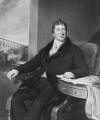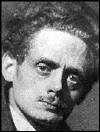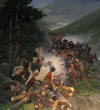|
|
1 |
|
August |
|
1545 |
|

Andrew
Melville
born
Baldovie.
Scholar,
theologian
and
religious
reformer,
his
reputation
brought
scholars
from
the
Europe
to
study
at
Glasgow
and
St
Andrews.
|
|
|
|
1 |
|
August |
|
1714
|
|

Death
of
Queen
Anne;
George
I,
Elector
of
Hanover
becomes
King.
|
|
|
|
1 |
|
August |
|
1747 |
|

Act
of
Proscription
of
Tartan
that
followed
the
1745
Rising.
|
|
|
|
2 |
|
August |
|
1696 |
|

Robert
Campbell
of
Glenlyon,
who
had
taken
part
in
the
Massacre
of
Glencoe,
died
in
poverty
in
Bruges.
|
|
|
|
2 |
|
August |
|
1922
|
|

Alexander
Graham
Bell,
inventor
of
the
telephone,
died
in
Nova
Scotia.
|
|
|
|
3 |
|
August |
|
1460
|
|

James
II
killed
by
an
exploding
cannon
at
the
siege
of
Roxburgh
Castle.
|
|
|
|
3 |
|
August |
|
1573
|
|


Sir
William
Kirkcaldy
of
Grange
executed,
after
defending
Edinburgh
Castle
on
behalf
of
Mary
Queen
of
Scots
from
May
1568
to
May
1573.
|
|
|
|
4 |
|
August |
|
1900 |
|

Elizabeth
Bowes-Lyon,
the
future
Queen
Elizabeth,
the
Queen
Mother,
born.
|
|
|
|
4 |
|
August |
|
1914 |
|
Britain
declared
war
on
Germany.
His
Majesty's
Government
informed
the
German
Government
on
August
4th,
1914,
that,
unless
a
satisfactory
reply
to
the
request
of
His
Majesty's
Government
for
an
assurance
that
Germany
would
respect
the
neutrality
of
Belgium
was
received
by
midnight
of
that
day,
His
Majesty's
Government
would
feel
bound
to
take
all
steps
in
their
power
to
uphold
that
neutrality
and
the
observance
of
a
treaty
to
which
Germany
was
as
much
a
party
as
Great
Britain.
The
result
of
this
communication
having
been
that
His
Majesty's
Ambassador
at
Berlin
had
to
ask
for
his
passports,
His
Majesty's
Government
have
accordingly
formally
notified
the
German
Government
that
a
state
of
war
exists
between
the
two
countries,
as
from
11
p.m.
to-day.
The
First
World
War
had
begun
on
28th
July
1914
with
Austria-Hungary's
declaration
of
war
with
Serbia.
|
|
|
|
5 |
|
August |
|
1305 |
|

Sir
William
Wallace
betrayed
and
handed
over
to
the
English.
|
|
|
|
5 |
|
August |
|
1388 |
|

Battle
of
Otterburn
in
which
Scots
defeat
Henry
Percy,
(Hotspur)
but
James,
Earl
Douglas,
died
out
of
sight
of
his
army.
"A
dead
man
won
the
field".
Sir
John
Sinclair,
Sir
Walter
Sinclair
and
Sir
James
Lindsay
took
up
the
dying
Douglas's
banner
and
went
back
into
the
battle
crying
"Douglas".
Tom
Steel,
Scotland's
Story
ISBN
0006370039
p
57
(English
sources
say
the
battle
was
on
19th
August:
John
Sadler,
Border
Fury,
England
and
Scotland
at
War
1296-1568
ISBN
1405840226
p
275.)
|
|
|
|
6 |
|
August |
|
1881 |
|

Sir
Alexander
Fleming,
discoverer
of
penicillin,
born.
|
|
|
|
7 |
|
August |
|
1548 |
|

The
young
Mary
Queen
of
Scots
sailed
from
Dumbarton
Castle
to
Roscoff,
France,
following
the
Treaty
of
Haddington,
which
betrothed
her
to
Francis,
the
Dauphin
of
France.
|
|
|
|
8 |
|
August |
|
1503 |
|

James
IV
married
Margaret
Tudor,
daughter
of
Henry
VII
of
England.
The
marriage
was
known
as
the
Union
of
the
Thistle
and
the
Rose.
|
|
|
|
9 |
|
August |
|
1757
|
|

Thomas
Telford,
the
civil
engineer
born
in
Westerkirk,
near
Dumfries.
|
|
|
|
10 |
|
August |
|
1460 |
|

James
III
crowned
at
Kelso
Abbey.
|
|
|
|
11 |
|
August |
|
1306
|
|
Battle
of
Dalry.
Robert
the
Bruce
defeated
by
John
MacDougall
of
Lorne,
kinsman
of
John
Comyn.
|
|
|
|
11 |
|
August |
|
1862 |
|

General
Sir
David
Y
Henderson,
the
first
Officer
Commanding
(OC)
the
Royal
Flying
Corps,
born
in
Glasgow.
|
|
|
|
11 |
|
August |
|
1892 |
|

Hugh
MacDiarmid
(Christopher
Murray
Grieve)
born
in
Langholm
in
Dumfriesshire.
|
|
|
|
12 |
|
August |
|
1332
|
|
Battle
of
Dupplin
Moor
near
Perth
in
which
Edward
Balliol
defeated
the
Regent,
Earl
of
Mar.
|
|
|
|
12 |
|
August |
|
1990 |
|
Roy
Williamson,
Scottish
folk
musician
and
songwriter,
died.
A
founder
member
of
the
folk
group,
"The
Corries",
for
whom
he
wrote
the
song
which
has
since
become
Scotland's
unofficial
National
Anthem,
"Flower
of
Scotland".
The
Corries
|
|
|
|
13 |
|
August |
|
1888 |
|

John
Logie
Baird,
inventor
of
the
first
television,
born
in
Helensburgh.
|
|
|
|
13 |
|
August |
|
1907 |
|

Sir
Basil
Spence,
architect
of
Edinburgh
University
Library,
born.
|
|
|
|
14 |
|
August |
|
1040 |
|
Duncan
I
killed
in
battle
at
Pitgaveny
leading
his
army
against
Macbeth.
|
|
|
|
14 |
|
August |
|
1863 |
|

Sir
Colin
Campbell
died.
Born
Colin
MacIver,
he
adopted
the
surname
of
his
uncle
who
sponsored
his
military
education.
At
the
Battle
of
Balaclava
in
1854
as
Commander
of
the
Highland
Brigade
of
the
1st
Division
he
lead
the
93rd
Sutherland
Highlanders
as
the
"Thin
Red
Line"
repulsing
the
Russian
Cavalry.
He
sought
and
obtained
permission
to
wear
the
Highland
Bonnet
instead
of
the
Cocked
Hat
that
went
with
his
appointment.
|
|
|
|
15 |
|
August |
|
1057 |
|
Macbeth
killed
in
battle
with
Malcolm
Canmore
at
Lumphanan.
|
|
|
|
15 |
|
August |
|
1645 |
|

_small.jpg)
The
Battle
of
Kilsyth.
James
Graham,
the
Marquis
of
Montrose,
defeated
General
Baillie's
Covenanter
Army
at
Colzium,
Kilsyth.
|
|
|
|
15 |
|
August |
|
1771 |
|

Sir
Walter
Scott
born
to
a
Walter
Scott
,
a
Writer
to
the
Signet,
and
Anne
(née
Rutherford).
|
|
|
|
15 |
|
August |
|
1822 |
|
George
IV
arrived
at
Leith
on
board
"The
Royal
George"
at
the
start
of
his
visit
to
Edinburgh.
His
visit
to
Scotland
was
organised
by
Sir
Walter
Scott,
and
led
to
a
revival
of
interest
in
Scotland.
|
|
|
|
15 |
|
August |
|
1916 |
|
Wing
Commander
Gordon
Sinclair,
who
commander
"A"
Flight
No
310
Squadron,
the
first
Czech
Unit
formed
in
the
UK,
during
the
Battle
of
Britain,
born.
He
died
in
2005.
|
|
|
|
15 |
|
August |
|
1945 |
|

VJ
Day.
Victory
over
Japan. 2015 was the
70th Anniversary, marked by commemorative service in St
Martin-in-the-Fields Church, Trafalgar Square and a Drumhead Service and
Wreath-laying ceremony on Horse Guards Parade followed by a reception in the
grounds of Westminster Abbey, hosted by The Royal British Legion.
|
|
|
|
16 |
|
August |
|
1445 |
|

Margaret
Stewart,
daughter
of
James
I
and
Lady
Joan
Beaufort,
died
in
Châlons.
She
had
married
Louis
XI
son
of
Charles
VII
and
Maria
d'Anjou
on
24
June
1436
in
Tours
Cathedral.
|
|
|
|
16 |
|
August |
|
1766 |
|
Carolina
Oliphant,
Baroness
Nairne,
born.
Writing
as
Mrs
Bogan
of
Bogan
she
adapted
Scottish
airs,
many
with
Jacobite
themes,
and
amongst
her
most
popular
are
"Charlie
is
my
darling"
and
"Will
ye
no
come
back
again?".
|
|
|
|
17 |
|
August |
|
1424 |
|

Battle
of
Verneuil
sur
Avre
during
the
Hundred
Years
War.
French
and
Scottish
forces
were
defeated
by
the
English
with
losses
of
around
9,000
and
John
Stewart,
Earl
of
Buchan
and
Sir
Archibald
Douglas
were
killed
along
with
many
French
nobles.
In
France
this
is
considered
by
some
as
important
as
Agincourt.
Les
Valois
directs
Multimap.com
Verneuil
sur
Avre
|
|
|
|
17 |
|
August |
|
1560 |
|

The
Scottish
Parliament
ratifies
the
25
Articles
of
the
Scots
Confession,
leading
the
way
to
the
Scottish
Reformation.
2010
was
the
450th
Anniversary.
|
|
|
|
17 |
|
August |
|
1876 |
|
James
Eric
Drummond,
7th
Earl
of
Perth,
born.
He
was
a
diplomat
and
the
first
General
Secretary
of
the
League
of
Nations.
|
|
|
|
17 |
|
August |
|
2010 |
|

Bill
Millin,
piper
to
Lord
Lovat
at
D
Day,
died,
aged
88.
|
|
|
|
18 |
|
August |
|
1746 |
|
Arthur
Elphinstone,
Lord
Balmerino,
was
beheaded
at
Tower
Hill
for
his
part
in
the
'45
Rising.
On
the
scaffold
he
said
"I
am
afraid
there
are
some
who
may
think
my
behaviour
bold;"
and,
speaking
to
a
gentleman
near
him,
added,
"Remember,
sir,
what
I
tell
you;
it
arises
from
a
confidence
in
God,
and
a
clear
conscience."
|
|
|
|
18 |
|
August |
|
1864 |
|
Elsie
Inglis,
Scottish
Suffragette,
born.
|
|
|
|
19 |
|
August |
|
1560 |
|
James
Crichton
"The
Admirable
Crichton",
scholar,
soldier
and
adventurer,
born.
|
|
|
|
19 |
|
August |
|
1646 |
|
Alexander
Henderson,
Presbyterian
theologian,
died.
He
was
instrumental
in
establishing
Presbyterianism
as
the
Church
of
Scotland
and
the
adoption
of
the
National
Covenant.
|
|
|
|
19 |
|
August |
|
1745 |
|

Prince
Charles
Edward
Stuart
"The
Young
Pretender"
raised
his
Standard
at
Glenfinnan
at
the
start
of
the
'45
Rising.
|
|
|
|
19 |
|
August |
|
1808 |
|
James
Nasmyth,
engineer
and
inventor
and
builder
of
the
first
steam
hammer,
born.
|
|
|
|
20 |
|
August |
|
1560 |
|

Mary
Queen
of
Scots
lands
at
Leith.
|
|
|
|
21 |
|
August |
|
1689 |
|
Battle
of
Dunkeld.
The
Jacobite
Highlanders
victory
at
Killiecrankie
was
shortlived
as
they
were
defeated
by
the
newly
formed
Cameronians
at
Dunkeld.
|
|
|
|
21 |
|
August |
|
1754 |
|
William
Murdoch
(aka
Murdock),
inventor
of
coal-gas
lighting,
born
at
New
Cumnock,
Ayr.
|
|
|
|
21 |
|
August |
|
1930 |
|
Princess
Margaret,
daughter
of
the
future
George
VI
and
Queen
Elizabeth,
born
at
Glamis
Castle.
|
|
|
|
22 |
|
August |
|
1138 |
|
The
Battle
of
the
Standard
was
fought
near
Northallerton,
Yorkshire.
The
battle
was
fought
as
part
of
David
I's
support
for
Matilda,
a
claimant
of
the
English
throne.
|
|
|
|
22 |
|
August |
|
1642 |
|

Charles
I
raised
his
Standard
at
Nottingham
at
the
start
of
the
Civil
War.
|
|
|
|
23 |
|
August |
|
1305 |
|

The
execution of
Sir
William
Wallace,
hanged,
drawn
and
quartered
at
Smithfield,
London.
The
site
is
marked
by
a
memorial
on
the
wall
of
St
Bartholomew's
Hospital,
West
Smithfield.
|
|
|
|
23 |
|
August |
|
1582 |
|

The
Ruthven
Raid.
James
VI
was
abducted
by
dissident
nobles
including
the
Earls
of
Gowrie,
Mar
and
Glencairn
who
wished
to
remove
the
king
and
government
from
the
influence
of
theDuke
of
Lennox
and
James
Stuart,
the
Earl
of
Arran,
by
imprisoning
him
in
Ruthven
Castle.
A
Short
History
of
Scotland,
by
Andrew
Lang
on
Undiscovered
Scotland:
XXII:
Reign
of
James
VI
|
|
|
|
24 |
|
August |
|
1198 |
|
Alexander
II
born
in
Haddington,
Lothian.
|
|
|
|
24 |
|
August |
|
1482 |
|
Berwick-upon-Tweed
was
officially
declared
part
of
England
after
changing
hands
on
numerous
occasions
in
the
past.
It
received
special
mention
in
government
documents
along
with
England
and
Scotland.
In
1856
Britain
signed
a
peace
treaty
with
Russia
after
the
Crimean
War
but
Berwick-on-Tweed
was
omitted.
The
town
was
technically
at
war
with
Russia
for
the
next
113
years
until
peace
was
declared
in
1966.
|
|
|
|
24 |
|
August |
|
1560 |
|

The
Scottish
Parliament
passed
a
law
establishing
the
Scottish
Reformation
and
the
Church
of
Scotland,
presbyterian
in
government.
2010
is
the
450th
Anniversary.
|
|
|
|
24 |
|
August |
|
1682 |
|
John
Maitland,
Duke
of
Lauderdale,
Scottish
politician,
died.
He
was
Charles
II's
deputy
in
Scotland.
|
|
|
|
24 |
|
August |
|
1947 |
|
First
Edinburgh
International
Festival.
|
|
|
|
25 |
|
August |
|
1330 |
|


The
Battle
of
Teba
This
is
the
origin
of
the
real
"Braveheart"
story.
When
Robert
the
Bruce
died
in
1329
his
heart
was
removed
and
embalmed.
According
to
many
accounts,
starting
with
14th
Century
John
Barbour's
"The
Bruce",
and
including
that
of
the
Lockhart
family,
whose
name
derives
from
the
subsequent
adventure,
as
The
Bruce
requested,
his
heart
was
to
be
taken
to
Jerusalem
by
Sir
James
Douglas,
known
as
"The
Black
Douglas"
,
accompanied
by
Sir
William
St
Clair
of
Roslin,
Sir
Robert
and
Sir
Walter
Logan,
Sir
William
Keith,
Sir
Alan
Cathcart
and
Sir
Symon
Loccard
of
Lee,
and
one
other
knight
unnamed.
A
monument
in
Teba
reads
"Sir
James
Douglas
most
loyal
comrade
in
arms
of
Robert
the
Bruce
King
of
Scots
while
on
his
way
to
present
the
Heart
of
Bruce
at
the
church
of
the
Most
Holy
Sepulchre
Jerusalem
the
good
Sir
James
turned
aside
to
support
King
Alfonso
XI
capture
the
strategic
Castle
of
the
Stars
Teba
&
was
slain
in
battle
August
25
1330"
|
|
|
|
25 |
|
August |
|
1819 |
|
James
Watt,
developer
of
the
steam
engine,
died.
|
|
|
|
25 |
|
August |
|
1875 |
|
John
Buchan,
novelist
and
statesman
who
served
as
Governor
General
of
Canada
died.
|
|
|
|
25 |
|
August |
|
1930 |
|
The
actor,
Sir
Sean
Connery,
was
born
in
the
Fountainbridge
area
of
Edinburgh.
|
|
|
|
25 |
|
August |
|
1942 |
|
The
Duke
of
Kent
and
all
but
the
rear
gunner
Flt/Sgt
Andrew
Jack
were
killed
when
his
Sunderland
Flying
Boat
W4026
crashed
into
the
Eagle's
Rock,
near
Berriedale,
Caithness.
|
|
|
|
26 |
|
August |
|
1612 |
|

300
Scottish
Mercenaries,
in
3
companies
of
100
each
led
by
acting
Lieutenant
Colonel
(substantive
Captain)
Alexander
Ramsay
were
ambushed
and
defeated
by
Norwegian
Militia
at
Kringen.
For
a
long
time
the
Norwegian's
believed
one
of
the
company
commanders
from
Caithness,
George
Sinclair,
killed
there,
had
been
the
leader
and
the
battle
has
long
been
associated
with
Sinclair.
Of
the
134
who
survived
the
battle,
only
18
were
taken
to
Oslo,
and
4
officers
sent
to
Copenhagen,
4
repatriated,
and
1
junior
officer
was
later
sent
home.
Initial
Norwegian
reports
said
there
were
550
Scots
and
450
Norwegians
present.
By
the
19th
century
the
Scots
number
had
inflated
to
900.
2012
marked
the
400th
Anniversary.
|
|
|
|
26 |
|
August |
|
1875
|
|
John
Buchan,
novelist
and
statesman
who
served
as
Governor
General
of
Canada
born
in
Perth.
|
|
|
|
27 |
|
August |
|
1472 |
|

Pope
Sixtus
IV's
Bull
erected
the
See
of
St.
Andrews
into
an
archbishopric,
and
its
cathedral
into
the
metropolitan
church
for
the
whole
of
Scotland.
|
|
|
|
27 |
|
August |
|
1748 |
|
James
Thomson,
Poet
and
author
of
"Rule
Britannia"
died.
|
|
|
|
27 |
|
August |
|
1784 |
|
James
Tytler
made
the
first
hot
air
balloon
flight
in
Britain,
ascending
some
300
feet
from
Comely
Garden
and
landing
in
Restalrig
Road.
|
|
|
|
28 |
|
August |
|
1296 |
|
Edward
I
of
England
held
a
"parliament"
at
Berwick
and
required
all
prominent
Scots
to
swear
allegiance
to
him.
Their
names
were
recorded
in
the
"Ragman
Roll",
so
called,
it
is
believed,
from
the
tangle
of
seals
attached
thereto.
(There
was
an
earlier
"Ragman
Roll"
in
1291.)
|
|
|
|
28 |
|
August |
|
1640 |
|
The
Battle
of
Newburn
on
Tyne.
An
experienced
Scots
Army
under
Alexander
Leslie,
the
Earl
of
Leven
defeated
a
smaller
and
less
experienced
English
force,
during
the
Second
Bishops'
War,
as
a
result
of
Charles
I's
attempt
to
impose
the
Anglican
Prayer
Book
in
Scotland.
|
|
|
|
29 |
|
August |
|
1797 |
|
12
demonstrators
against
Militia
recruitment
are
killed
by
the
Cinque
Ports
Dragoons
at
Tranent.
|
|
|
|
29 |
|
August |
|
1930 |
|
The
last
36
inhabitants
leave
St
Kilda.
|
|
|
|
30 |
|
August |
|
1856 |
|

Sir
John
Ross,
Scots
Arctic
Explorer
died.
|
|
|
|
31 |
|
August |
|
1805 |
|
Dr
James
Currie,
biographer
of
Robert
Burns,
died.
|
|